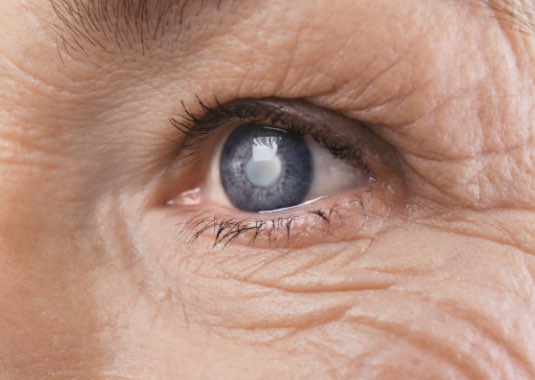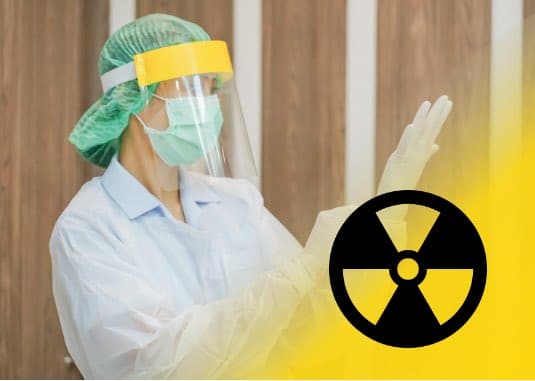Healthcare personnel in medical imaging who may be exposed to radiation need wear radiation protection glasses and other protective clothing and accessories.
Why Radiation Protection Glasses Are Important
Radiologists and others who work in the medical imaging environment are advised to wear radiation protection glasses to protect their eyes from the effects of damaging radiation. Along with the risk of severe damage to the eyes, eye exposure to radiation without adequate protection may also put healthcare workers at the risk of developing career-shortening injuries or illnesses over time.
Radiation safety requires covering multiple body parts, including the eyes, to prevent radiation exposure. Protecting the eyes is essential since radiation can harm the tissues in your eyes. When working in radiology, protecting every part of your body from potential exposure is necessary. Often, radiologists also wear side shields for the eyes, thyroid shields, lead gloves and a protective apron.

How Radiation can Harm Your Vision
The radiation effect on the eye can be extensive since it can negatively impact the iris, sclera, conjunctiva and the blood vessels of the retina. Permanent damage to the lens of the eye can take place with even a small dose of radiation. Since healthcare workers in medical imaging may be continually exposed to radiation, wearing protective clothing is imperative.
The lens is the part of the eye where cataracts can form. A low dose of radiation can lead to the development of abnormal cells in the lens, and over time, these cells can mutate, causing cell death. Eye radiation side effects under these circumstances include the lens of the eyes becoming cloudy and developing cataracts.
Research shows that radiation exposure to the eyes can also increase light-scattering intensities or LSIs, which can lead to a higher risk of cataracts. While cataracts can be corrected and removed if they do develop, prevention is a much better path forward. Wearing appropriate radiation protection eyewear can significantly reduce such risks.

Lead Glasses Keep You Safe
Lead glasses are the best choice for radiation protective eyewear because they reduce the impact of radiation exposure on the eye lenses. Wearing lead glasses will prevent a majority of damaging radiation from reaching the eyes. In fact, in one study, leaded glasses decreased the radiation dose rate on the eye lens by as much as 5-10 times.* This shows the importance of radiation protection glasses in reducing the radiation dose rate. Researchers advise radiology specialists to wear comfortable lead glasses to protect their eyes.
Leaded glasses will attenuate radiation passing through the lenses of the eyewear and keep your eyes safe. The front lens of the eyewear should be at least 0.5mm or 0.6mm Pb as this provides the greatest protection to weight ratio, ensuring that the wearer will not be distracted from the procedure at hand by glasses that are too heavy. Side lenses should be at least 0.25 mm Pb. Side protection from x-ray exposure will also prevent eye problems. If you are wearing leaded protective clothing to cover other parts of your body, you will need to wear lead glasses as well.
Where Anti-Radiation Goggles Should Be Used
Even though healthcare workers are not in the main path of the X-ray, the particles from X-rays can scatter at several angles, which means technicians outside of the direct path can still be exposed. Therefore, when working in a medical imaging setting, such as interventional radiology, operating rooms or the cardiac cath lab, it is essential to protect your eyes by wearing radiation protection glasses.

Factors to Consider When Choosing Radiation Protection Glasses
There are multiple factors to consider when choosing radiation protection glasses. You’ll need to look at the level of protection your lead glasses or prescription lead glasses provide. You’ll also want eyewear that takes peripheral vision into account.
The protective eyewear should also be comfortable to wear. Your radiation protection glasses will need to fit well to reduce radiation exposure effectively. These glasses should not slide down your nose when you move your head.
When selecting your glasses, consider the amount of pressure on your nose or under your eyes. Too much pressure means the glasses may not be suitable to wear all day. The build quality of the protective eyeglasses is also important, as they should be durable in case of falls and should be able to resist scratches as well.
Why Lead Protective Eyewear Is the Best Choice
Lead based barrier technologies that include protective eyewear are the best choice in keeping your eyes safe from radiation exposure. Lead-protective eyewear is composed of the desired material for radiation protection. Lead is very effective in protecting people from radiation exposure because it is a dense metal. It reduces the effects of X-rays and gamma rays. Lead-based radiation protection glasses are essential for medical professionals to keep their eyes safe from radiation exposure.
* Comparing strategies for operator eye protection in the interventional radiology suite.
Thornton RH, Dauer LT, Altamirano JP, Alvarado KJ, St Germain J, Solomon SB
J Vasc Interv Radiol. 2010 Nov; 21(11):1703-7.

